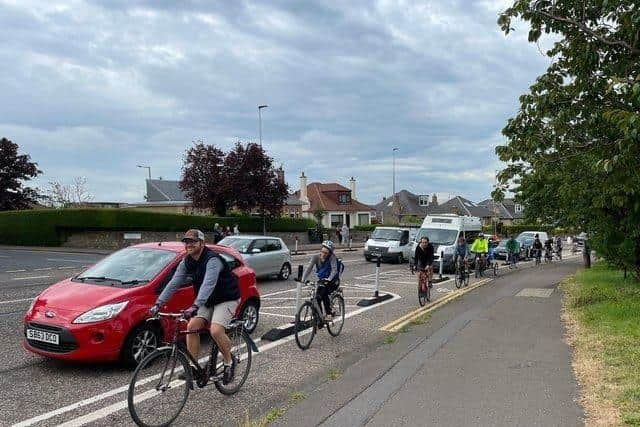Spaces for People scheme cost taxpayers £26m with many changes being reversed
This article contains affiliate links. We may earn a small commission on items purchased through this article, but that does not affect our editorial judgement.
Taxpayers’ money is still being spent on the divisive schemes, which often pitted the interests of cyclists and pedestrians against vehicle drivers during the Covid pandemic. Opposition politicians in cities such as Edinburgh railed against the schemes, some of which were welcomed by local residents with others supported by the public.
The scheme, which ran Scotland-wide, saw the installation of temporary bike lanes, the widening of pavements, and streets being pedestrianised in response to the pandemic and a requirement for social distancing.
Advertisement
Hide AdAdvertisement
Hide AdIn answer to written questions from the Scottish Conservatives, the Scottish Government confirmed £26m had been spent on the projects across the country. The highest spenders were Glasgow and Edinburgh city councils, both of which spent more than £4m on the schemes. SNP-run Dundee council spent almost £2m on their version, while local authorities in Aberdeen, East Lothian, Fife, North Lanarkshire, Perth and Kinross, and the Highlands all clamed more than £1m for the schemes.
Money continues to be paid out by the Government for the schemes. A total of £100,000 has been spent this financial year on schemes in Fife, Moray and Renfrewshire. Several schemes have been removed despite split opinion on their effectiveness and impact on businesses, local communities and improvements to access to cycling infrastructure and safety.
Liam Kerr, the Scottish Conservative net zero spokesperson, said the scheme was an example of the Government failing to consult properly on something many believe was a “complete waste of money”. "Some of the objectives of Spaces for People were noble enough,” he said. “But right across Scotland the implementation and scale of these schemes have been deeply unpopular, infuriating residents, businesses and commuters.
"Now we learn it's cost the taxpayer almost £26m, a figure which is still rising. Many people will think that's a complete waste of money, and an enormous sum which could have been spent in far better ways. The next time the Scottish Government wants to use public money for an initiative like this, it should properly consult those paying for it and being affected by it."
Changes in Edinburgh, such as pavement widening schemes in the busy areas of Bruntsfield, Tollcross and Stockbridge, were among those removed by Edinburgh council.


A Transport Scotland spokesperson said: “We do not recognise this portrayal of the Spaces for People programme. The majority of the initiatives have been made permanent, whilst others have appropriately been removed as we’ve recovered from the pandemic. Local authorities, Sustrans and Transport Scotland have learned much from the Spaces for People programme, as we continue to consider how best to deliver permanent active travel infrastructure in the future.
“To support this work, a full evaluation report has been published by Sustrans Scotland. This report not only demonstrates that most people welcomed the measures that were taken at the start of the pandemic, but also shows strong popular support for making them permanent.
“We widely publicised the fact that over £38m had been allocated to fund Spaces for People infrastructure in 2020. Changes to initial proposals have resulted in final expenditure of £33m.
Advertisement
Hide AdAdvertisement
Hide Ad“They were deliberately rapid interventions, made with limited consultation, responding to the public health emergency created by the Covid–19 pandemic. The temporary measures ensured people across Scotland could safely distance from one another when making necessary journeys. We are committed to continuing to increase investment in active travel to make sure that the healthiest, greenest and most affordable mode of transport is also the safest and most convenient.”
Want to hear more from The Scotsman's politics team? Check out the latest episode of our political podcast, The Steamie.
It's available wherever you get your podcasts, including Apple Podcasts and Spotify.
Comments
Want to join the conversation? Please or to comment on this article.
